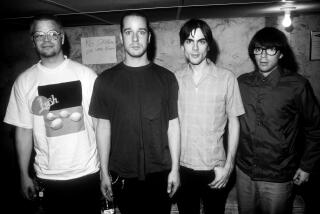A hook or two in a sea of effects
Glasvegas
“Glasvegas”
Columbia Records
**
To many American ears, the Scottish band Glasvegas might sound like U2 as fronted by the dad played by Mike Myers in “So I Married an Axe Murderer.” But singer James Allan’s overwhelming brogue is a formidable instrument that livens up some otherwise boilerplate epic rock on the band’s self-titled new album.
From the cheeky band name to the monsoons of Creation Records production effects, everything about “Glasvegas” screams “subject to heavy popularity tariffs if exported out of the UK.” But the earnestness of the band’s vision occasionally hits a “Darklands”-era Jesus and Mary Chain sweet spot. The hook of “Geraldine” is a sweet-hearted falsetto catcall, and “Daddy’s Gone” and “S.A.D. Light” could have been Marvelettes singles if the Wall of Sound was instead an Acre of Delay Pedals.
Too often, though, the album slogs through droning nonstarters such as “Go Square Go” and “Polmont on My Mind,” and that’s even excepting “Stabbed,” a ridiculous spoken-word soliloquy that jacks Beethoven’s “Moonlight” Sonata so flagrantly it’d make J.R. Rotem blush. It’s a bull market for fetishizing exotica in rock music today, but though “Glasvegas” certainly sounds like Scotland, it feels more like its eponymous Sin City: sprawling and glittery but ultimately artificial.
-- August Brown
--
Jim Hall & Bill Frisell
“Hemispheres”
(ArtistShare)
***
There seems to be a perception in modern jazz that free playing must be harsh and grating or at least difficult to absorb on first listen. With a number of inside-out improvisations mixed with respectfully reshuffled standards, this jazz guitar summit between 50-year veteran Jim Hall and Americana-dusted experimentalist Bill Frisell dispels that notion.
The sprawling two-CD package offers a set of home-recorded duo explorations and another with Hall and Frisell backed by a sympathetic rhythm section. The pairing is most striking when the players allow their most unfettered whims room to flower, such as on the 15-minute spacescape, “Migration.” Frisell’s effects-pedal orchestra forms a hypnotic backdrop for Hall’s most atmospheric impulses, while drummer Joey Baron adds a few unexpected rumbles and textures to the quartet’s session.
Mostly, this bright, elegant collection sounds like everyone is trying desperately not to wake the neighbors as the two gracefully intertwining guitars lead the way. The results are warmly intimate if somewhat monochromatic, but it’s an undeniably appealing color.
-- Chris Barton
--
Various Artists
“Undone: A Musicfest Tribute to Robert Earl Keen”
Right Ave./Thirty Tigers
***1/2
If all higher-education programs were as lively and illuminating as this one, university enrollment would mushroom. Texas State University’s Center for Texas Music History put on this salute last year in Colorado to one of the most literate in Texas’ long line of esteemed singer-songwriters, although Keen hasn’t been as widely recognized outside Americana music circles as some of his Lone Star State peers such as Lyle Lovett, Nanci Griffith and Steve Earle.
Nearly two dozen musicians, including Keen and his band at the end of the two-CD set, play more than two dozen of his songs here in a powerful testament to his considerable skills with pen and guitar. Among the participants: Reckless Kelly, Randy Rogers, Cory Morrow, Chris Knight, Kathleen Braun, Wade Bowen, Max Stalling and Doug Moreland.
When a heart breaks in one of Keen’s songs, every crack and shattered shard is felt, as Bowen demonstrates in his take on the exquisitely etched portrait of a man watching his former love return to town with someone new in “Lynnville Train.” Stalling evokes the sights, sounds and smells of a small-town dance that Keen painted so deftly in “No Kinda Dancer.” Keen can be as raucous as he is contemplative, and that’s where Moreland goes in his choice of the on-the-road-at-80 rave-up, “Daddy Had a Buick.”
Keen saves what’s probably his best-known song, “The Road Goes On Forever,” to close out his five-song set, stretched out into a 12-minute celebration that, like so many of his songs, makes you wish it really could go on indefinitely.
-- Randy Lewis
More to Read
The biggest entertainment stories
Get our big stories about Hollywood, film, television, music, arts, culture and more right in your inbox as soon as they publish.
You may occasionally receive promotional content from the Los Angeles Times.










